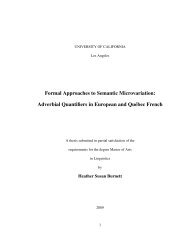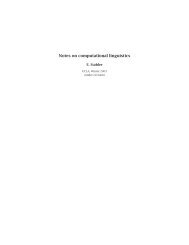Patterned Exceptions in Phonology - UCLA Department of Linguistics
Patterned Exceptions in Phonology - UCLA Department of Linguistics
Patterned Exceptions in Phonology - UCLA Department of Linguistics
Create successful ePaper yourself
Turn your PDF publications into a flip-book with our unique Google optimized e-Paper software.
1. Introduction<br />
This dissertation presents a model <strong>of</strong> how phonological patterns <strong>in</strong> the lexicon could be<br />
learned and used by speakers and hearers, and perpetuated over time. This chapter<br />
<strong>in</strong>troduces the phenomenon <strong>of</strong> lexical patterns, discusses why they are problematic <strong>in</strong><br />
current phonological th<strong>in</strong>k<strong>in</strong>g, and gives a preview <strong>of</strong> the model.<br />
1.1. Lexical regularities<br />
I will use the terms lexical regularity and phonological pattern to refer to generalizations<br />
about the phonological properties <strong>of</strong> the set <strong>of</strong> words <strong>in</strong> a language. Regularities can be<br />
observed that apply with<strong>in</strong> morphemes, with<strong>in</strong> morphologically complex words, and<br />
across sets <strong>of</strong> words.<br />
1.1.1. Regularities with<strong>in</strong> morphemes<br />
In English roots <strong>of</strong> the form sCVC, the two Cs generally cannot be both labial, both velar,<br />
both nasal, or both [l]. 1 The generalization is quite strong (see Berkley 1994 for statistical<br />
f<strong>in</strong>d<strong>in</strong>gs on this and related phenomena <strong>in</strong> the English lexicon), and hypothetical<br />
exceptions, though pronounceable, sound somewhat ill-formed (?[I1], ?[I3]). 2<br />
Generalizations like this one are <strong>of</strong>ten attributed to morpheme structure constra<strong>in</strong>ts<br />
1 Although such sequences are common across word or morpheme boundaries: It’s Lily! or Ask Angry Joe.<br />
2 A search <strong>of</strong> the onl<strong>in</strong>e Oxford English Dictionary for sCVC words only (i.e., not the full set <strong>of</strong><br />
sC(C)VC(C) words, which follow similar restrictions) found, collaps<strong>in</strong>g variant spell<strong>in</strong>gs and<br />
pronunciations, just 3 words with two labials (Spam, spume, spoom), 9 words with two velars (skoke, skeck,<br />
skowke, skeg, skig, scak, scoke, scag, scug), 3 words with two nasals (smon, snam, snum), and no words<br />
with two ls. Most <strong>of</strong> these words were unfamiliar to me.<br />
1

















